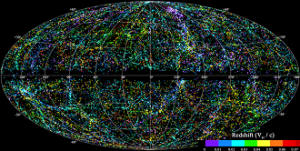
Totality and infinit
The complex is fundamental for understanding wholeness, Edgard Morin wrote: “Only complex thinking can civilize our thinking” (Morin, 2008, p. 23), in the absence of a totalizing and comprehensive discourse, complex thinking itself is.
wholeness, Edgard Morin wrote: “Only complex thinking can civilize our thinking” (Morin, 2008, p. 23), in the absence of a totalizing and comprehensive discourse, complex thinking itself is.
Giordano Bruno was the first to intuit that the infinite was fundamental to the nascent modern thought, but this one took refuge in the rational dualism (objectivism x subjectivism) and in the human finite that does not admit the mystery and the infinite present in the cosmic totality.
Current thinking, thanks to the physical complexity that came from quanta and relativity theory, is launched into the depths of the universe to think about matter and dark energy and their new and eccentric phenomena that challenge current models of physics, science, and maybe religion.
Edgar Morin, before reflecting on the paradigmatic turn, says that the West “the fruitful child of the schizophrenic Cartesian dichotomy and clerical puritanism, also commands the double aspect of Western praxis, on the one hand anthropocentric, ethnocentric, egocentric since it is the subject ( because based on the self-worship of the subject: man, nation or ethnicity, individual) by another and correlatively manipulative, icy “objective” since it is the object ”(Morin, 2008, p. 81).
Without considering themselves dogmatic, arrogant, and self-referential, this thought, even when projecting to the Infinite, even appealing to God and even invoking dialogue, is itself arrogant, the slightest amount of questioning enough to note arrogance.
Now, even for the religious to admit the mystery, it is indispensable to admit the idea of God and the infinite, while for the “rational” thought (not the dogmatic rationalism) to admit the complexity of the phenomena is only to make serious science and to investigate the reality, nature on the one hand, and to admit man’s place within it is the only possibility of overcoming the objectivist and egocentric arrogance of modern thinking.
The infinite that is also claimed by current thinkers such as Ricoeur, Lévinas who explained the sense of alterity before the Infinite: “The idea of infinity does not start from Me, nor from a need for the Self that accurately assesses its emptiness. In it the movement starts from the thought, not from the thinker. ”(Levinas, 1988, p. 49).
LEVINAS, Emmanuel. Totalidade e infinito. Tradução José Pinto Ribeiro, Lisboa- Portugal, Edições 70, 1988.









